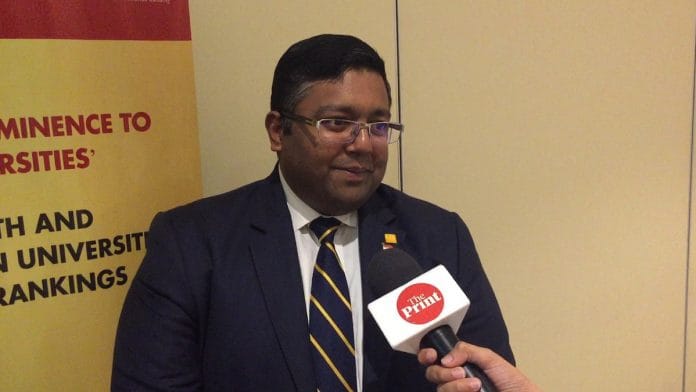New Delhi: Indian higher education institutions are certain to enter the top 100 in Quacquarelli Symonds (QS) World University Rankings in a couple of years, India head of the ranking agency Ashwin Fernandes has said.
None of India’s best educational institutions, including the Indian Institutes of Technology (IITs) and the Indian Institute of Science (IISc), have till now featured in the top 100 in the prestigious London-based university rankings, which is accepted the world over.
However, with the Narendra Modi government’s increased focus on rankings — by way of creating Institutes of Eminence (IoEs), for instance — the agency is hopeful that Indian institutes will rise up the ladder.
Speaking to ThePrint, Fernandes, regional director (MENA & South Asia), QS, said, “When I started engaging with Indian education institutions eight years back, we did not even have them in the top 500.
“Today we have two (three) institutions in the top 200, there is appetite to do better and it’s just a matter of a couple of years that our top institutions will make it to the 100s.”
In the QS global rankings 2020, three Indian institutes — IIT-Bombay, IIT-Delhi and IISc-Bangalore — found place among the top 200.
“We can see that the institutions are inching towards top 100. There is definitely a lot of scope for improvement in areas like employer reputation, faculty student ratio and internationalisation but the institutions are working towards it,” he told ThePrint.
Ten-point agenda
Fernandes was speaking at an event in the national capital to release a ten-point agenda for institutions to ensure they feature in the world university rankings.
The agenda has been prepared by Professor C. Raj Kumar, Vice-Chancellor of OP Jindal University, a private institution in Haryana’s Sonepat that has been named an IoE by the Union Ministry of Human Resource Development.
It includes incorporation of institutional and corporate philanthropy for higher education, more academic freedom and institutional autonomy, multi-disciplinary learning, a transparent admission process with no management quota, and internationalisation.
Kumar has also suggested hiring of outstanding faculty, building a culture of research and publications, and promoting diversity and active participation of all stakeholders.
Also read: No exams for children aged 3-6 years, say Modi govt’s new guidelines for pre-schools






